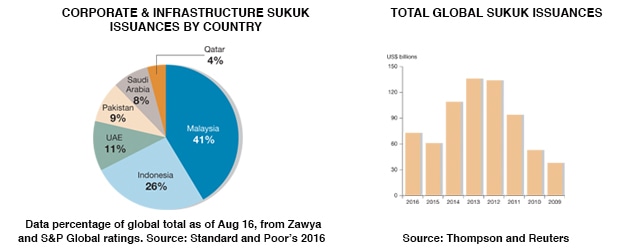Investors snapped up Saudi Arabia’s debut international sukuk, a type of Islamic financing gaining popularity worldwide.

The sale of Islamic bonds, known as sukuk, moved farther into the mainstream with Saudi Arabia’s record issuance of $9 billion in its debut international sukuk on April 12. Not only was the issue the first dollar sukuk from a Gulf Cooperation Council (GCC) country in recent years, but it also was the largest emerging-markets debt issue for the year to date, surpassing Kuwait’s $8 billion conventional bond in March.
Saudi Arabia received more than $33 billion in bids for the issue, which was evenly split between 5-year and 10-year tranches. “The proceeds will help ease pressure on the kingdom’s foreign reserves,” says Jason Tuvey, Middle East economist at Capital Economics in London. “The country is making significant progress in reducing its budget deficit.”
The Saudi government’s recent decision to reinstate benefits for civil servants appears to be a U-turn on one of the more unpopular austerity measures, rather than the start of a wholesale reversal of recent belt tightening, Tuvey says. “The key point is that the decision comes in the context of a much-improved budget position,” he says.
The dollar sukuk was issued with a coupon of 2.894% for the 5-year portion, and 3.628% for the 10-year. Citi, HSBC and J.P. Morgan were global coordinators on the Saudi sukuk, while BNP Paribas, Deutsche Bank and NCB Capital helped manage the sale.
Saudi Arabia has since awarded Citi a license to provide a full range of investment banking and capital market services in the kingdom. In 2004, Citi sold its 20% stake in Samba Financial Group, but the US bank is eager to return to the kingdom at a time when Saudi Arabia is diversifying its economy under the Vision 2030 plan led by deputy crown prince Mohammed bin Salman.
A key element of the sweeping reform program is next year’s planned initial public offering of a 5% stake in Saudi Aramco, which likely will be the biggest IPO in history. The national oil company paid a significant premium to the government in its debut sukuk sale in late March, a riyal-denominated issue worth the equivalent of $3 billion.
The recent Saudi issues gave a boost to the sukuk market, which is taking aim at the record issuance set in 2012. Fitch Ratings said in a recent report that sukuk issuance in 2017 will continue at a robust pace, as more sovereigns issue sukuk as well as conventional bonds. Oman is considering a sukuk after mid-year, while several African countries, including Nigeria and Kenya, are also planning significant sukuk issues, according to bankers. Bank issuance of sukuk could also rise in some markets, according to Fitch. In the GCC, Dubai Islamic Bank in February became the first financial institution to issue sukuk this year, with a $1 billion five-year note.
Indonesia listed two sukuk valued at $3 billion on Nasdaq Dubai in March, bringing the total of Dubai’s sukuk listings to a new global high of $52 billion. Dubai’s emergence as the world’s largest sukuk issuance center follows a pledge by Sheikh Mohammed bin Rashid Al Maktoum, Dubai’s ruler, to make the emirate the global capital of the Islamic economy.



